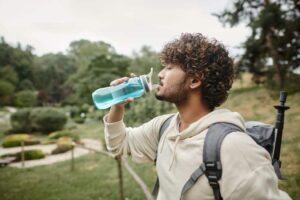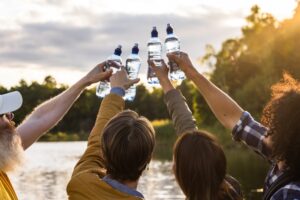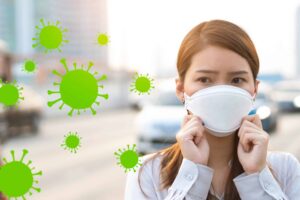Water Hygiene While Travelling: What You Need to Know
Get the facts straight: Common myths about water hygiene while travelling debunked here.

Water Hygiene – Infection Prevention
When it comes to water hygiene while traveling, several common questions arise regarding safety and health precautions:
Is tap water safe to drink in my travel destination?
Tap water safety varies by country. In many developing regions, it’s recommended to drink bottled water or water that has been properly boiled or disinfected. This includes using safe water for brushing teeth and making ice cubes.
How can I purify water while traveling?
There are various methods for purifying water, including boiling, using chemical disinfectants (e.g., iodine or chlorine tablets), and water filters. If you’re unsure about the water quality, consider using these methods.
Can I get sick from swimming in local water bodies?
Yes, swimming in untreated water or poorly maintained swimming pools can lead to infections, especially if you accidentally swallow contaminated water. It’s important to choose safe swimming locations, such as well-maintained pools.
What foods and drinks should I avoid?
To avoid foodborne illnesses, it’s recommended to steer clear of raw or undercooked meats, seafood, and dairy products that aren’t pasteurised. Be cautious with fresh fruits and vegetables that might have been washed with unsafe water. Drinking pasteurised or bottled drinks is usually safe.
How do I avoid waterborne diseases like Legionella?
If staying in a hotel or accommodation with water systems, it’s essential to be aware of Legionella risks. Ensure that water systems are well maintained, and if you’re responsible for water hygiene, proper risk assessments and temperature monitoring are key to minimising bacterial growth.
These guidelines help travellers minimise their risk of water-related illnesses, ensuring a safer and more enjoyable trip.

Is Water in a Bottle as Safe as Bottled Water?
When travelling, staying hydrated is essential, but concerns about tap water safety often lead people to choose bottled water. However, a 2017 study revealed that 66% of bottled water samples across WHO regions contained pathogens. This raises questions about bottled water’s safety and whether self-purification might be a better option.
Tips for Safe Drinking Water:
– Bottled fizzy drinks with intact seals are generally safe.
– Boiling or treating tap water using chlorine tablets, or using filter bottles (e.g., Aquapure Traveller) can offer eco-friendly and reliable alternatives to bottled water.
Why Self-Purification?
Purifying your own water reduces the risk of consuming counterfeit or low-quality bottled water. It also helps cut down on plastic waste, which is often hard to recycle in some countries. Boiling water or using high-quality filtration bottles can ensure safer hydration while travelling and is a sustainable choice.
In conclusion, while bottled water is strictly regulated in the UK, this isn’t always true in other regions. Self-purification not only ensures better safety but also supports eco-conscious travel.
Water Hygiene – Infection Prevention Using Vaccines
Water is a vital resource, especially when travelling, but it is prone to contamination by bacteria, viruses, and protozoa. While purifying water is key to staying safe, vaccines offer protection against some waterborne diseases.
Key Vaccines for Waterborne Infections:
1. Hepatitis A: A viral infection spread through contaminated food or water. The vaccine provides long-lasting protection after two doses.
2. Typhoid: Bacterial infection from contaminated food or water. Vaccination lasts up to three years.
3. Cholera: An acute bacterial disease. The oral vaccine is available in two forms (inactivated or live).
While vaccines protect against specific diseases, water purification methods are still essential to reduce the risk of infections that lack vaccines.
For more details, visit TravelHealthPro
Written by Derek Evans FFTM RCPS(Glasgow), FISTM, FRPharmS, FRGS
Travel Health and Vaccination Lead



